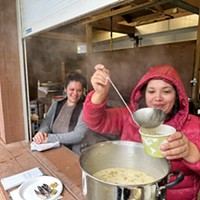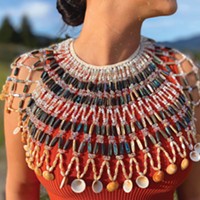[
{
"name": "Top Stories Video Pair",
"insertPoint": "7",
"component": "17087298",
"parentWrapperClass": "fdn-ads-inline-content-block",
"requiredCountToDisplay": "1"
}
]
Born in 1951, Wilfred Albers Jr. learned to fend for himself at the dinner table as one of nine children. Then, as a Yurok tribal member growing up in Eureka, he had to be tough and prove himself, sometimes with his fists. In high school in the 1960s there was a tradition where teenagers would come to a gathering for a fight to prove who was the toughest kid from the toughest school. Wilfred "Junior" Albers was a target. According to his little brother Ernie, Junior just wanted to take his frustrations out with gloves on in the boxing ring.
Wilfred Albers Sr. was a boxer and taught all his children the craft, including his two girls. Junior took a particular delight and concentrated on boxing rather than team sports. He learned a lot as one of a string of protégés of local trainer/manager/promoter Gene Campbell at the Eureka Boxing Club on Fifth Street. Campbell made it all possible for Albers and many others, including Gary Albers, Junior's brother, Marty Jimenez and Rich Colegrove.
Junior Albers boxed through high school in the late '60s and started to make a name for himself locally in amateur bouts, running up a remarkable record at the Armory, Redwoods Acres and the Municipal Auditorium boxing venues. He was 6 feet tall and, as he developed, topped out at just shy of 180 pounds in his prime, a light heavyweight. He could dance or fight inside, and Campbell was a genius at breaking down other fighters' styles to Albers' advantage. Albers is arguably the best boxer ever from the North Coast. No argument from me.
The 1960s and '70s were a heyday locally for boxing, following generations of locals fighting at venues throughout the county. Anyone who wanted to give it a try could get a fight after a few training sessions and get matched up for a bout. Amateurs from around the regions would fill up the undercard for the top-billed fights. Boxing night at the Municipal Auditorium was energized.
Albers became the headline draw week after week. By the time he turned pro, he'd fought close to 180 fights and only lost a small percentage. He had 18 titles, including two Golden Gloves in San Francisco, and was one fight away from Michael Spinks in the 1976 Olympic Trials. Spinks won the gold that year at the Olympics and later became the first light heavyweight to win the world heavyweight title. Albers also won the United States Indian Amateur Athletics Light-Heavyweight Championship in 1976.
After nine years of boxing as an amateur, Albers decided to go pro. Campbell had connections and gave him confidence that he could compete with top fighters. Albers' goal was to become a contender. Junior moved to Stockton to train with one of the top boxers in the world, Alvaro "Indian Yaqui" Lopez, the No. 1 world light heavyweight contender.
The two had met earlier in Eureka when Lopez boxed Albers out of his Diamond Belt Amateur title in one of Lopez's last amateur fights. At the time there were lots of Native Americans at the fights in Eureka and Lopez's trainer was asked if Lopez was Native since he looked like Albers. His trainer said he was Yaqui Indian from Zacatecas, Mexico. Lopez's new nickname stuck and the two became friends.
Lopez fought four times for the world title, each time losing amid controversy. He had a world championship fight scheduled against Victor Galindez in Rome late in 1977. Albers went along as his sparring partner and garnered the co-main-event fight against the European Light Heavyweight Champion Aldo Traversero. Traversero had a record of 70-2 as a pro and Albers only had a few professional fights under his belt. Albers was learning a lot from Lopez, sparring more than 100 rounds in Italy before the fight. This was Albers' chance to become a top contender.
Albers fought a great fight. He got bounced around early, but adjusted and caught Traversaro with half a dozen jolting uppercuts. It was a classic fight that came down to a split decision with Albers on the losing end. Traversaro was quoted after the fight saying Albers was "about the toughest guy I ever fought and so strong." It was a loss but also maybe Albers' best fight. He was in his prime and got a shot at a top world ranking. He barely lost.
Throughout his boxing days, Albers worked at the Samoa Mill as a load operator and truck driver. He went to the gym after his shift and always had time to help his younger brothers box when they were done with their sports teams' practices. He fought a few more professional fights, including a loss to his friend Lopez in Stockton.
The boxing scene was fading some up on the North Coast and it was a long way to the metropolitan areas for fights, especially as Albers now had a couple young children of his own. It was hard to get professionals to fight up here, as Eureka had been known mostly as an amateur venue and top contenders saw Albers as a no-win situation. He was tough and good and unranked, so pros who fought him had nothing to gain and lots lose.
Albers also was getting lonely at the gym, having a hard time finding sparring partners. Lopez and Mike Quarry, another top contending light heavyweight and younger brother to Jerry Quarry, both spent time up here sparring with Albers, but the dream was fading. He and his brother Gary headlined the last professional card in Humboldt County in the early '80s.
Junior went to work at the Boy's Club training fighters and then opened his own gym, the Albers Boxing Club on Second Street in Old Town, running it for years. He owned and pampered some classic cars, and loved riding his Harley-Davidson motorcycle. He would give tough street kids a meal and have them put on the gloves and prove themselves in the ring, not on the corner. He taught them to fend for themselves and work out their frustrations without self-destruction. He even occasionally provided a roof for a runaway or street kid. Albers taught kids to overcome their circumstances and improve themselves.
Albers died in 1999 at the age of 48 in an accident on his Harley near Hayfork. He was deeply missed in Eureka. Unlike the famous lines from On the Waterfront in which Marlon Brando's Terry Malloy laments his boxing career to his brother, Albers got his chance at being a contender and came awfully close. He was no bum and never took a dive — he was a local hero, the marquee name in boxing in Humboldt County for years. Junior Albers has a big spot in our county's trophy case.
Rod Kausen (he/him) is a retired teacher and coach.
Speaking of...
-

'Our Food is Our Medicine'
Mar 28, 2024 -

The Reluctantly Famous Shoshoni Hostler
Feb 15, 2024 -

Gifting Local, Trans Remembrance and Acorns
Nov 24, 2023 - More »
Comments (2)
Showing 1-2 of 2
more from the author
-
The Best of Fans
Bill and Emily Langenbach
- Oct 7, 2021
-
Gene Cotter's Basketball Jones
- Sep 16, 2021
-
To Choke
- Aug 19, 2021
- More »
































